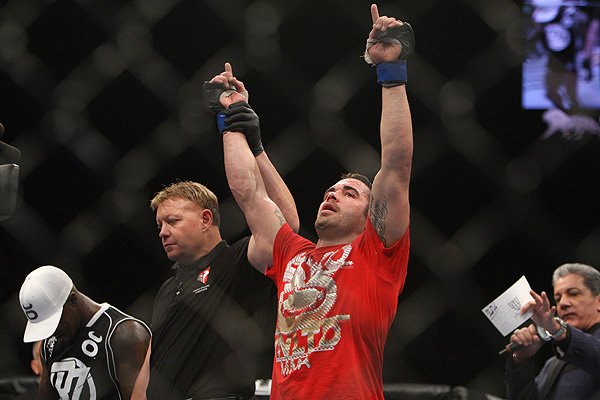An MMA Christmas List: 2014 Edition
Bargain Hunters

The
recently retired Jamie Varner has called for a fighters’ union. |
Photo: Dave Mandel/Sherdog.com
Patrick Wyman, contributor: For better or worse, the wild world of mixed martial arts is currently tumbling head over heels toward becoming a legitimate sport, with the UFC as its uppermost tier. Regardless of Bellator MMA’s success on the margins, with its consistently strong television ratings and promising new direction under the capable leadership of Scott Coker, make no mistake: The UFC is where the big-time money is for top fighters. The UFC is where the big sponsors, now including Reebok (sorry, Dave & Buster’s), have made their home. The UFC, not Bellator, is where the brand-name recognition resides.
That, ladies and gentleman, is what a major league looks like. However, the UFC is missing the cornerstone of what makes those major leagues, from the NFL to the NBA to the PGA, function properly on a day-to-day, month-to-month and year-to-year basis: collective bargaining between the athletes and management to ensure a fair distribution of revenue. “It’s no different than any other professional sports league,” said UFC CEO Lorenzo Fertitta when discussing the Reebok deal, an agreement into which none of the fighters -- individually or collectively -- had any real input. It is in fact fundamentally different, contra Fertitta, because in those leagues, the distribution of sponsorship revenue among athletes and between ownership and labor is collectively bargained.
Advertisement
The fighters and their managers stood by and watched Zuffa grab lifetime likeness rights from the athletes for little or nothing in return. They did nothing when the unilaterally imposed sponsorship tax contributed to the slow, agonizing death of that revenue stream. They offered little public resistance to the Reebok deal, about which they have almost no information and the effects of which are already costing fighters like Brendan Schaub substantial sponsorship income. A class-action lawsuit is in the works right now, and currently contracted fighters in addition to Cung Le may -- or more likely will not -- join the suit. A crippling work stoppage is inevitable if the current trends continue. The only question is when.
For MMA to continue to grow as a legitimate sport that deserves to be mentioned alongside the NFL, NBA or even PGA golf, both Zuffa and the fighters need to step up and start acting like they belong in that conversation. That means buttressing the structures that give major sports leagues the institutional support to last beyond the short-term. It would have to be an association -- fighters are independent contractors, not employees -- rather than a union, and it would have fewer collective bargaining powers, but it would still represent a massive improvement over the status quo.
This is not a zero-sum game, where anything the fighters gain amounts to a Zuffa loss. More money for the fighters means longer careers with more of a chance to build name value over time. More money means better athletes entering the sport in the first place. Both of those things amount to a better product, and a better product means growing revenue for everybody involved.
A fighters’ association is a legitimate goal, and it is within reach.
Continue Reading » Gender Equity
Related Articles








